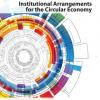News
Displaying Results 1 - 6 of 6
According to the 2023 Global Circularity Gap Report by the Circle Economy Foundation, transitioning to a circular economy will allow us to fulfil people's needs with only 70% of the materials we currently extract and use. The benefits of the circular economy are tremendous, as it not only addresses…
Decades of unsustainable consumption and production patterns have resulted in the exhaustion of finite resources and environmental degradation. As governments reassess scenarios, the circular economy model - where resources are reused, recycled, and repurposed to reduce waste - has become a pillar…
A UNECE working paper released today, Population and migration statistics in Armenia: current situation, future plans and ways to improve describes how Armenia is improving its statistics on population and migration by combining administrative data with sample surveys. The study reviews innovations…
The transition from linear to circular economies requires fundamental rethinking of trade policies and regulations. “Harmonized System” codes (HS codes) are a key pillar of the tariff infrastructure for international trade. These HS codes were designed at a time when circular economy considerations…
June 2022 has been the month of trade discussions in Geneva, first with the World Trade Organization’s (WTO) 12th Ministerial Conference (MC12) and then UNEC’s Steering Committee on Trade Capacity and Standards (SCTCS). Both looked in detail at responses to the ongoing impact of COVID-19, both…
A high-level mission of United Nations experts has reviewed the plans and preparations for the upcoming census of Turkmenistan, due to take place on 17-27 December 2022. Working alongside the State Statistics Committee of Turkmenistan, the delegation— a multi-agency team consisting of experts from…







